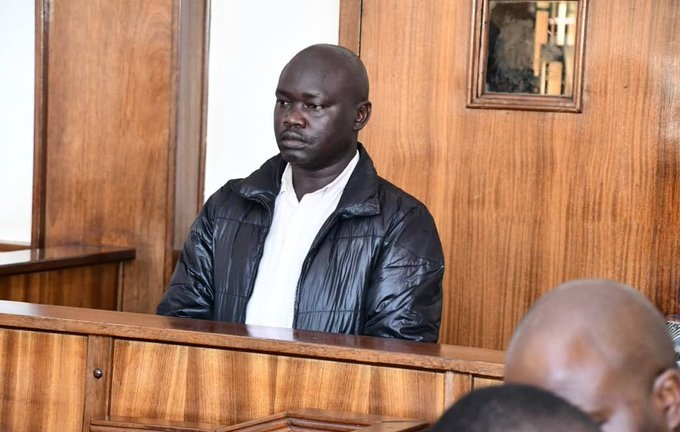
The Standards, Utilities and Wildlife Court in Kampala has granted bail to Stanley Kisambira the Judiciary driver.
Court presided over by Chief Magistrate Gladys Kamasanyu on Thursday granted Kisambira a non-cash bail of 10 million Shillings and his sureties who included his wife Grace Mukisa Lugolole, his nephew Patrick Wambi and his fellow driver in the Judiciary Francis Mbaziira were also bonded at 5 million Shillings non-cash.
Kisambira was first arrested last week at Central Police Station in Kampala and released on bond after an audio clip went viral. In the clip, Kisambira is heard saying that he would cause suicide and kill his principal and bodyguard and himself in an accident protesting low pay.
On Monday he was arrested after reporting to police as part of his bond conditions. He was taken to Buganda Road Magistrates Court and appeared before the Grade One Magistrate Fidelis Otwao who read to him the charges against him.
Court heard that on May 12th, 2023 within Uganda, Kisambira through a computer shared on the Judiciary Transport WhatsApp group information recorded audio which was likely to promote hostility against judges in the Judiciary.
According to the prosecution, Kisambira reportedly indicated that the Judges’ salaries are unfairly over and above those of their drivers and that a driver can decide to cause a road accident by ramming into a moving truck thereby killing the Judges and their bodyguards.
He was remanded until June 2nd, 2023, and asked to apply for bail before Magistrate Asuman Muhumuza on that day.
The Standards Utilities and Wildlife Court issued a production warrant for Kisambira requiring Uganda Prisons to produce him to court without fail.
Kamasanyu read to Kisambira charges afresh which he denied. His lawyers from GEM Advocates led by Derrick Bazekuketta and Stanley Okecho applied for bail.
Bazekuketta told the court that the charges against their client are bailable and that he is still presumed to be innocent until proven to be guilty. He said Kisambira’s charges do not involve violence but instead relate to issues of poor remuneration of drivers by the judiciary where he has worked for 16 years.
Bazekuketta added that Kisambira has a fixed place of abode in Sazagula Zone Mukono District which is in the jurisdiction of the court and presented an introduction letter from his Chairperson Local Council one from his ancestral residence in Namawambi A Cell in Uganda.
The prosecution led by Allan Mucunguzi opposed the bail application on the grounds that he might abscond from trial since he has not produced an introduction letter from the place where he normally resides.
Mucunguzi added that he also doesn’t have an introduction letter from his employer and as such there is no proof that he is employed by the Judiciary.
In her ruling, Kamasanyu said that she was satisfied with the submissions by Kisambira’s lawyers that he has presented his employment Identity Card, is still presumed to be innocent, and has a fixed place of residence and work.
She noted that Kisambira’s sureties have proven to the court that they know him and demonstrated capacity to compel him to return to court and as such have been found to be substantial. She adjourned the case to June 12th, 2023.
Trouble for Kisambira started when he recorded audio clips that subsequently went viral on social media platforms. In the clips, Kisambira, a driver of Mbale High Court judge Godfrey Namundi, expressed his dissatisfaction with salary disparities in the judiciary for drivers.
Following his statements, Judiciary Permanent Secretary, Pius Bigirimana, accused Kisambira of misconduct and wrote to him on May 16. Bigirimana stated that Kisambira should have used proper channels, such as the public service standing orders, to address his grievances instead of resorting to social media.
Bigirimana emphasized that inciting violence, making threats, and spreading false information are unprofessional, criminal, and punishable offenses. In the letter, Bigirimana asked Kisambira to explain his actions within five days, and failure to do so could result in disciplinary measures, including dismissal from the judiciary.





